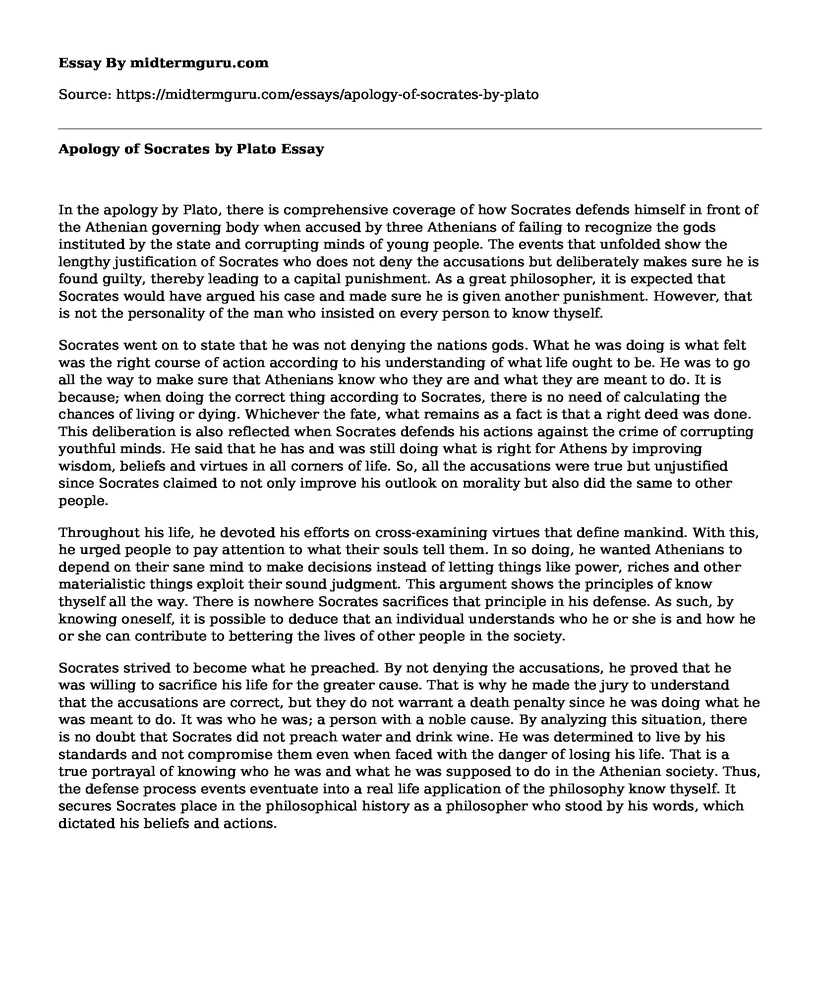In the apology by Plato, there is comprehensive coverage of how Socrates defends himself in front of the Athenian governing body when accused by three Athenians of failing to recognize the gods instituted by the state and corrupting minds of young people. The events that unfolded show the lengthy justification of Socrates who does not deny the accusations but deliberately makes sure he is found guilty, thereby leading to a capital punishment. As a great philosopher, it is expected that Socrates would have argued his case and made sure he is given another punishment. However, that is not the personality of the man who insisted on every person to know thyself.
Socrates went on to state that he was not denying the nations gods. What he was doing is what felt was the right course of action according to his understanding of what life ought to be. He was to go all the way to make sure that Athenians know who they are and what they are meant to do. It is because; when doing the correct thing according to Socrates, there is no need of calculating the chances of living or dying. Whichever the fate, what remains as a fact is that a right deed was done. This deliberation is also reflected when Socrates defends his actions against the crime of corrupting youthful minds. He said that he has and was still doing what is right for Athens by improving wisdom, beliefs and virtues in all corners of life. So, all the accusations were true but unjustified since Socrates claimed to not only improve his outlook on morality but also did the same to other people.
Throughout his life, he devoted his efforts on cross-examining virtues that define mankind. With this, he urged people to pay attention to what their souls tell them. In so doing, he wanted Athenians to depend on their sane mind to make decisions instead of letting things like power, riches and other materialistic things exploit their sound judgment. This argument shows the principles of know thyself all the way. There is nowhere Socrates sacrifices that principle in his defense. As such, by knowing oneself, it is possible to deduce that an individual understands who he or she is and how he or she can contribute to bettering the lives of other people in the society.
Socrates strived to become what he preached. By not denying the accusations, he proved that he was willing to sacrifice his life for the greater cause. That is why he made the jury to understand that the accusations are correct, but they do not warrant a death penalty since he was doing what he was meant to do. It was who he was; a person with a noble cause. By analyzing this situation, there is no doubt that Socrates did not preach water and drink wine. He was determined to live by his standards and not compromise them even when faced with the danger of losing his life. That is a true portrayal of knowing who he was and what he was supposed to do in the Athenian society. Thus, the defense process events eventuate into a real life application of the philosophy know thyself. It secures Socrates place in the philosophical history as a philosopher who stood by his words, which dictated his beliefs and actions.
Cite this page
Apology of Socrates by Plato. (2021, May 20). Retrieved from https://midtermguru.com/essays/apology-of-socrates-by-plato
If you are the original author of this essay and no longer wish to have it published on the midtermguru.com website, please click below to request its removal:
- Mid Term Questions on Globalization: Marx, Giddens, Weber
- Essay on Marxs Theory of Alienation and Philosophical Categories
- Essay on John Winthrops Puritan and Waldo Emerson Transcendentalism
- The Crito by Plato - Essay Sample
- Ethical Theories - Assignment Example
- What is Traditional Utilitarianism? - Paper Example
- Residents of Prinsloo vs Oil Refinery: An Ethical Dilemma - Essay Sample







